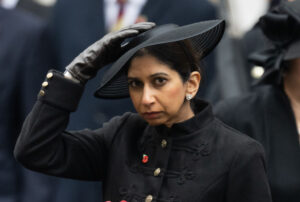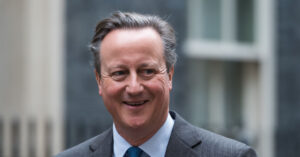In all the hue and cry over Tory civil war, the scotching of the populist experiment, and — some say — betrayal of a once-vaunted political realignment, the week’s other political bombshell was buried. As 2015’s last great Blairite returns from exile as Foreign Secretary, the man most responsible for his departure is also back — as a villain on reality TV.
Nigel Farage, the most influential British politician never to have served as MP, is the controversial star turn on this year’s I’m A Celebrity – Get Me Out Of Here!: an appearance that will, reportedly, net him £1.5m. Albeit somewhat muffled by Suella-related screeching, the press is already excitedly feasting: fans will reportedly “boycott” the series, friends worry it will “haunt” him, and haters grumble that the opposite might happen. After all, in the wake of his appearance in the last series, there are now people with a celebrity crush on Matt Hancock.
What may be less obvious, though, is that the latest round of Westminster court drama and reality-TV drama are the same story. And what they reveal is that far from being a failure, the much-hailed post-Brexit realignment has been a roaring success. It’s just not the realignment we wanted.
Since its advent with Big Brother in 2000, modern competitive reality TV has (perhaps unintentionally) existed as ironic comment on the official political process. Just like politics junkies (and in far greater numbers), reality TV enthusiasts follow the contestants’ ups and downs with the utmost devotion, argue over their merits, and cast votes with enthusiasm. The results are watched and debated. Reality TV is now even as dynastic as politics: Bobby Brazier, son of Big Brother’s most notorious superstar, the late Jade Goody, is riding as high in this year’s Strictly as Stephen Kinnock briefly was when elected in 2015.
The other comparison, as has grown increasingly apparent since Big Brother, is less cheerful. The net impact on audience lives of voting for or against Nigel Farage on I’m A Celebrity will be nil, beyond a measure of entertainment and something to discuss with colleagues at work. By contrast, what was the net impact of voting for Brexit, seven years later? Two dominant themes in Brexiteers’ arguments for leaving were: first, a desire to reclaim democratic self-governance from the stultifying effect of EU treaties and the unelected Commission; and second, lower immigration. Did it work? The judges’ scores, as they say on Strictly, are in — no, it didn’t.
After a brief post-Brexit dip, immigration is at its highest level ever. And after a landslide Tory majority in 2019, won for an expressed willingness to follow through on a decision made by British voters, today the second unelected Tory Prime Minister since that Johnson victory now enjoys an EU Commission-like appointee status without even his party’s mandate. This man has, in turn, appointed to his Cabinet an even less-elected Foreign Secretary: a man who isn’t even an MP. I can see how some would conclude that the main difference between voting in an election, and voting for your favourite couple on Strictly, is that the latter will cost you 15p from a BT landline.
Meanwhile, if voting is now largely unrelated to the terrain in which politics happens, what exactly is the nature of that terrain? It’s not a new observation that — with considerable historic help from the Tory Party — what is considered acceptable material for electoral politics is shaped some way upstream of voting, by an insider network of “statutory bodies”, watchdogs, czars, courts and the like. This blends seamlessly into a professionalised, often murkily-funded archipelago of NGOs that propagates guidelines, lobbies for pet causes, and either provides or withholds the moral imprimatur for official electoral politics. And the political outlook of this cadre, which exists in symbiotic relationship with official state institutions, is hostile to every form of Toryism except (at a pinch) the Cameroon variety.
It’s possible, up to a point, to intervene in this ecosystem by forming and funding your own NGOs. But in underwhelming contrast with the American Republican Party, whose institutional artillery is now laser-focused on preparing for a future programme of attack on the US version of this perceived hostile hegemony, the Tory-led “realignment” left its British analogue almost entirely intact. The clear inference is that a majority prefer it that way. And even accepting that this is now the key battlefield has a grim corollary: that contra optimists’ hopes, especially after 2019, the real political realignment has not been toward democratic accountability, but decisively in the other direction.
Meanwhile, for those without the social or financial table-stakes required to help shape the field of acceptable Westminster discourse — which is to say, ordinary voters — this leaves few avenues for expressing views discordant with the acceptable range of politics, as defined by this unelected consensus-formation machine. But here, too, the realignment we got isn’t the one we hoped for. Some imagined Brexit might usher in a new politics of belonging, with people brought together by love of locality, the givens of our life in common, and a shared effort to improve our social fabric together. Such hopes were, however briefly, raised by Johnson’s promised “levelling-up” agenda.
What we got instead, especially since Covid has tipped us decisively from a print-first to a digital-first culture, has been a radically unequal, deracinated, dematerialised, transnational public discourse of politics as overlapping fandoms. In digital form, such fandoms manifest as political firestorms, “dogpiling” opponents, or pushing pet causes via clicktivism and online petitions. Offline, it coalesces as “phatic protest”: street demonstrations oriented less toward actual policy, than a form of self-expression and group identity-formation.
The results are often jarringly transcultural: for example the protesters mimicking American ones by calling “hands up don’t shoot” at Britain’s police officers during the (transnational) BLM riots, despite the fact that only around 5% of British officers carry guns. The recent, global “Palestine” protests also fit this template, bringing together assorted far-Left and Islamist fandoms in a coalition that seems to presage previously unimaginable forms of transnational neo-polity.
How such pressure groups and seemingly decentralised memetic tides interact with real-world power and money is ambiguous. But one thing these phenomena resoundingly are not is a newly resurgent politics of place. Quite the opposite: if the globalisation of meme-driven street protest signals anything, it’s the ascendancy of a new politics of placelessness: the very phenomenon the Tories’ abortive “realignment” promised to end.
None of this is to say that elected politicians have no power, or that we’re all governed in perpetuity by a shadowy conspiracy. The truth is, as ever, more banal than the conspiracies. The actually existing realignment may be post-democratic, but it is far from being a closed shop. The tendency shown by the now-deposed Suella Braverman to speak and tweet as though already in Opposition implied that the position of Home Secretary did not, in fact, command the level of power over home affairs a naïve outsider might imagine it to afford. Even so, were the role completely toothless it would hardly have been worth anyone’s while to sack her for proposing (or so she argues) to enact actual policies in line with the wishes of Conservative voters.
Nonetheless, her expulsion, as with that of Liz Truss before her, illustrates the fate that awaits those who batter too noisily against the boundaries imposed by the symbiotic civil service and NGO-cracy, the combustible online rent-a-mob, or who knows what other extra-political interests. Where such actors align against a policy, however well-supported it nominally is electorally or by polling, that policy will be strangled at birth. In turn, this leaves no avenues for high-profile dissidents save abandoning “reality” altogether, and leaning into “TV”. That is: embracing a new status as influencers within the digital domain of politics fandom.
We might call this “politainment”, and its stars wield non-trivial levels of power over their political fandoms, much as online influencers in any other type of fandom. Here, too, you can flourish (after a fashion) whether or not you’re an insider. And being obnoxious or notorious is often an advantage. Consider the iconic “Q Shaman”, Jacob Chansley, who made photo headlines across the world after the January 6 Capitol riot. After a stint in jail, he is now, reportedly, running for Congress. This makes sense: the logic of internet celebrity is such that it doesn’t really matter whether the clout you acquire is generated by love or hate — a click is a click.
While Farage has played at the edges of politics since Brexit with his chat show on GB News and Reform party, could he now be garnering the energy needed for a comeback by re-inserting himself into the national consciousness via reality TV? His legions of haters will love watching him eat insects; meanwhile he’ll be on every tabloid front page for weeks on end. Who knows where a re-injection of publicity (not to mention hard cash) will take him. No surprise, then, to find him leaning hard into the collapse of dissident politics into entertainment, by hijacking the Reform Party mailing list to shill for I’m A Celeb votes.
But the flip side of this eruption of influencer politainment is its bleak corollary: the only way to be an insider, with access to real power, is by hewing to an increasingly narrowly defined consensus. The Overton window has been nailed shut.
Instead of rescuing 20th-century style democracy, the realignment buried it. Farage’s move simply attests that what is reported in the press as the political process is more accurately understood as a subset of reality TV, with at best an oblique relation to how decisions are actually taken.
Where Brexiteers dreamed of greater democratic accountability, the tumult their victory set in motion has entrenched financiers and insiders, even as it has made the views of voters ever more obviously irrelevant. And shifts that some hoped would widen the Overton window have produced, instead, a politics in which the only outlet for dissidents is as defanged internet celebrities.
So we got the realignment. It just wasn’t the one we ordered. The urgent project for every disappointed optimist of 2016 and 2019 is now to stop complaining about promises betrayed, drag our eyes from the TV, and lean into post-democratic reality.
Disclaimer
Some of the posts we share are controversial and we do not necessarily agree with them in the whole extend. Sometimes we agree with the content or part of it but we do not agree with the narration or language. Nevertheless we find them somehow interesting, valuable and/or informative or we share them, because we strongly believe in freedom of speech, free press and journalism. We strongly encourage you to have a critical approach to all the content, do your own research and analysis to build your own opinion.
We would be glad to have your feedback.
Source: UnHerd Read the original article here: https://unherd.com/




